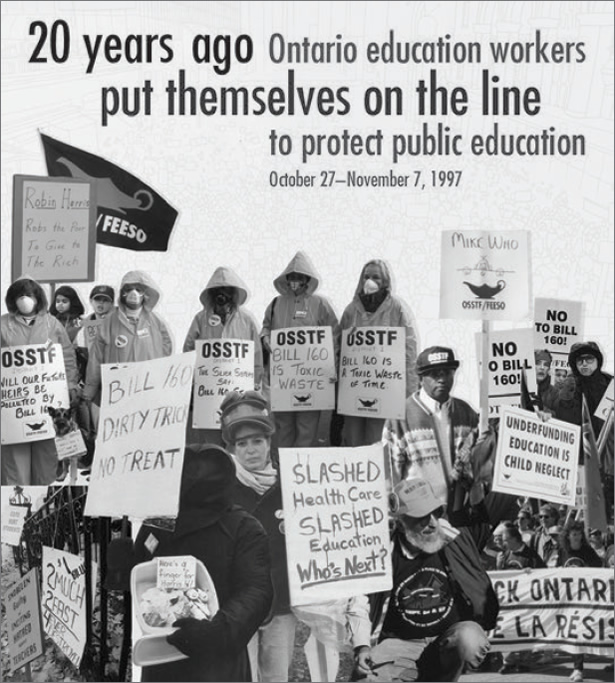On October 27, 1997, in a job action that remains the largest political protest ever undertaken by education workers in North America, over 125,000 teachers and support staff forced a two-week closure of more than 5,000 Ontario schools. The reason? Bill 160—The Education Quality Improvement Act. Bill 160 was introduced by Progressive Conservative Premier Mike Harris, and was intended to drastically change the face of publicly-funded education in Ontario. The proposed changes would have had such negative impacts for staff, students, parents and communities everywhere in the province that education workers were willing to engage in a full walkout under the specter of harsh government reprisals and a potential public backlash.
If Harris and his Tories had had their way, schools would have been treated like corporations. Education budgets would have been cut, significant increases in workloads would have been imposed, and the government would have stripped away all democratic mechanisms in place in the education system.
It’s true that a watered-down version of Bill 160 was eventually passed, and that it did inflict some serious damage on Ontario’s public education system. However, many of the most draconian measures that were contemplated in the original bill were ultimately withdrawn, and that would not have happened if education workers had not taken a bold and unprecedented stand. The mass walkout by educators deflected some of the worst elements of Harris’s full-scale assault on public education, and mitigated the damage. The ensuing cold war between educators and the Progressive Conservatives would last until the government changed hands in 2003, but the Harris government never again tried anything quite as heavy-handed as Bill 160.

Why we do commemorate that protest now, 20 years later? Is it still relevant today? In many ways, the events of 20 years ago shaped both the environment we work in and the character of our union today. Sadly, we are still saddled with fallout from the Harris years, most notably an antiquated, wrong-headed funding formula that has never adequately addressed student needs. But had we taken no action in 1997, things would be very much worse, and we look back on those protests now as a turning-point in the history of our Federation. We demonstrated to the government of the day, and we proved to ourselves, that when we act collectively and stand together in solidarity, we can have a significant impact—even in the face of a majority government determined to simply dismiss our concerns.
We commemorate the 1997 protests not only to remind us of the power that lies in solidarity and determined collective action, but also to keep us vigilant. We don’t know what the next provincial election will bring us, and even though we will do what we can to advocate for a positive outcome, we must always be prepared to take a stand should we be faced with another government that’s hostile to the interests of public education.